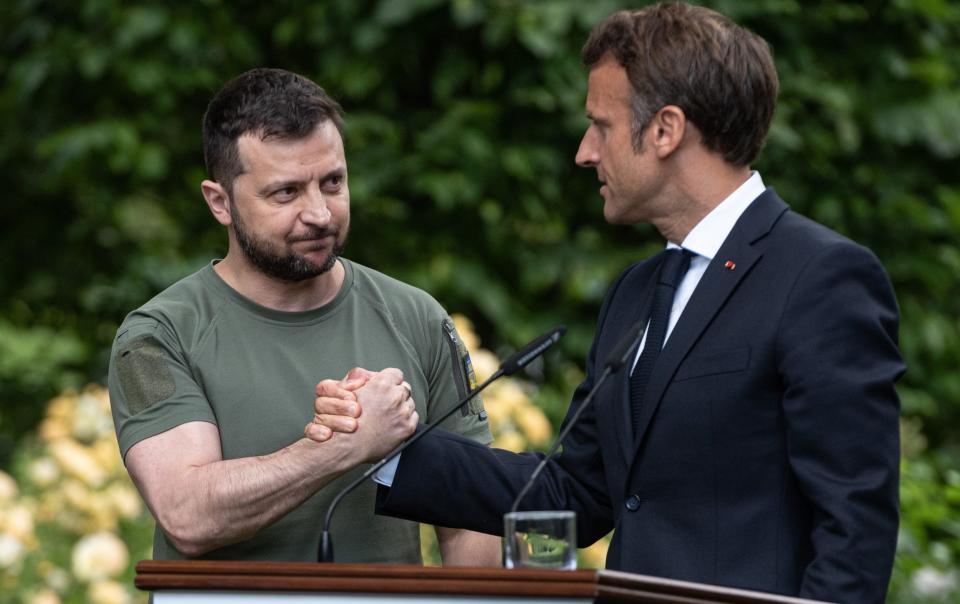Why Germany secretly fears losing power if Ukraine joins EU

Germany has privately called for the European Union’s governing treaties to be overhauled amid fears Ukraine’s pending membership could shift the power balance away from Berlin, The Telegraph can reveal.
A senior diplomatic source said Olaf Scholz, Germany’s chancellor, raised the issue at a recent meeting with EU counterparts in Brussels and called for treaty change before Kyiv is allowed to officially join.
If Ukraine becomes a full-fledged member, it would be the EU’s fifth-largest member state, but also its poorest, according to an analysis by the German Institute for International and Security Affairs.
Despite the outward celebration of Ukraine’ EU membership bid, that has prompted concerns behind closed doors.
Under the bloc’s current voting system, which takes into account the number of countries voting and their population, Kyiv would have nine per cent of the EU’s total powers.
Combining these powers with close ally Poland would make the pair more powerful than Germany, the EU’s largest and richest state. Bringing in other Central and Eastern European allies would comfortably create a majority within the bloc more powerful than the traditional Franco-German power-base.
“This would shift the balance of power within the EU further away from Germany and France more towards Central and Eastern Europe, where the countries, together with the Nordics, for the first time would become a more sizeable bloc in terms of voting power,” Dr Nicolai von Ondarza, of the German Institute for International and Security Affairs, said.
Mr Scholz wants the voting system to be reconfigured to ensure power blocs of EU nations cannot be formed in order to secure extra funding from their rich Western allies.
The German leader, who has been repeatedly criticised over his hesitancy in supporting Ukraine, wants national vetoes scrapped.
Emmanuel Macron, France’s president, has also previously spoken about a need to change the voting system in order to stop his country’s ambitions from being thwarted by smaller EU members.
Ukraine applied for, and was granted candidate status, to join the EU in record time following the Russian invasion on February 24.
The process is expected to take decades as Kyiv is made to carry out judicial, economic, democratic and anti-corruption reforms in order to fall in line with the bloc’s rules and values.
But President Volodymyr Zelensky wants to move faster.
“Our path to membership should not take years or decades,” he said this week. “We have to overcome this path quickly.”

His comments will heap pressure on EU leaders to move much more quickly.
Although Ukraine’s membership bid was endorsed by all 27 EU member states, Germany is not the only one quietly raising concerns.
Sources told The Telegraph that Portugal questioned whether Ukraine should be welcomed into the bloc, given the state of its economy.
According to pre-war calculations, Ukraine’s economy would be the worst within the EU if it were to join. This would force Portugal, for the first time, to become a net contributor to the bloc’s budget, meaning it would pay in more than it receives back in EU funding. The Czech Republic would be consigned to the same fate.
In the weeks building up to the EU’s decision to welcome Ukraine as a candidate, Kyiv poured hundreds of hours into diplomatic talks to reassure the bloc’s member states it wouldn’t abuse its powers.
France and Germany’s concerns were well-noted by Ukraine’s top diplomats when these negotiations began.
“They’re trying to think creatively how decision-making processes can be streamlined,” a top Ukrainian diplomat said. “Not to neutralise Ukraine but to avoid possible complications.”
The Ukrainian insisted Kyiv would not deliberately try to create a new power bloc within the EU to shift the balance towards Eastern and Central Europe.
“The fair point is we need to prepare our institutions and political class to produce officials to work here on an adequate level,” they added.
“This is a very important issue when Ukraine reaches this point to contribute and not complicate.”

 Yahoo Movies
Yahoo Movies 
